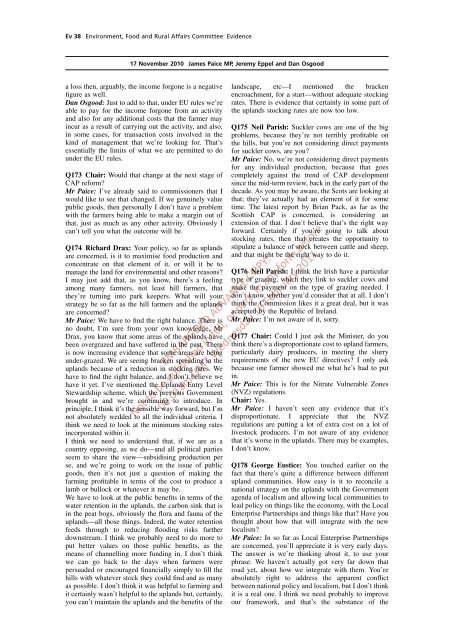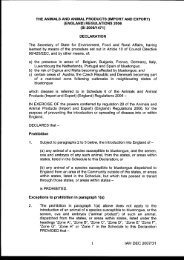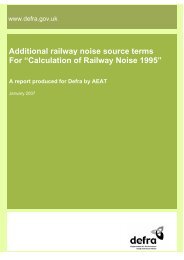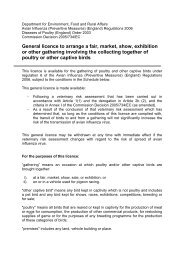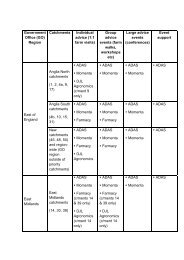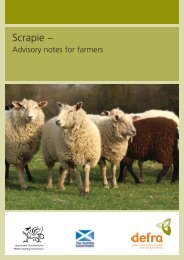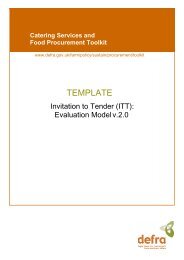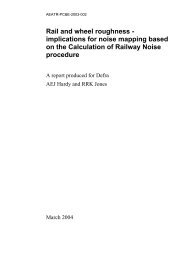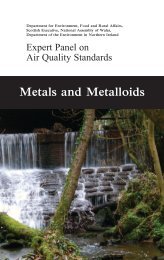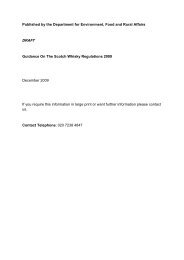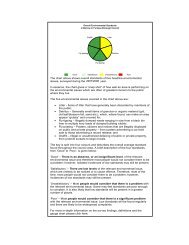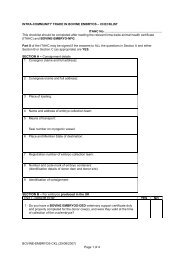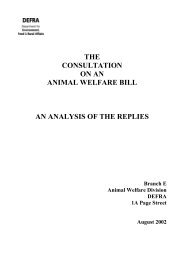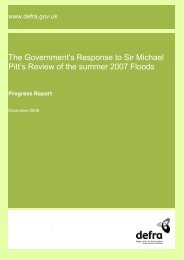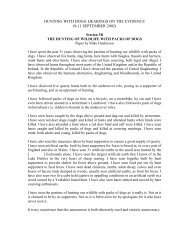Farming in the Uplands - ARCHIVE: Defra
Farming in the Uplands - ARCHIVE: Defra
Farming in the Uplands - ARCHIVE: Defra
You also want an ePaper? Increase the reach of your titles
YUMPU automatically turns print PDFs into web optimized ePapers that Google loves.
Ev 38 Environment, Food and Rural Affairs Committee: Evidence<br />
17 November 2010 James Paice MP, Jeremy Eppel and Dan Osgood<br />
a loss <strong>the</strong>n, arguably, <strong>the</strong> <strong>in</strong>come forgone is a negative<br />
figure as well.<br />
Dan Osgood: Just to add to that, under EU rules we’re<br />
able to pay for <strong>the</strong> <strong>in</strong>come forgone from an activity<br />
and also for any additional costs that <strong>the</strong> farmer may<br />
<strong>in</strong>cur as a result of carry<strong>in</strong>g out <strong>the</strong> activity, and also,<br />
<strong>in</strong> some cases, for transaction costs <strong>in</strong>volved <strong>in</strong> <strong>the</strong><br />
k<strong>in</strong>d of management that we’re look<strong>in</strong>g for. That’s<br />
essentially <strong>the</strong> limits of what we are permitted to do<br />
under <strong>the</strong> EU rules.<br />
Q173 Chair: Would that change at <strong>the</strong> next stage of<br />
CAP reform?<br />
Mr Paice: I’ve already said to commissioners that I<br />
would like to see that changed. If we genu<strong>in</strong>ely value<br />
public goods, <strong>the</strong>n personally I don’t have a problem<br />
with <strong>the</strong> farmers be<strong>in</strong>g able to make a marg<strong>in</strong> out of<br />
that, just as much as any o<strong>the</strong>r activity. Obviously I<br />
can’t tell you what <strong>the</strong> outcome will be.<br />
Q174 Richard Drax: Your policy, so far as uplands<br />
are concerned, is it to maximise food production and<br />
concentrate on that element of it, or will it be to<br />
manage <strong>the</strong> land for environmental and o<strong>the</strong>r reasons?<br />
I may just add that, as you know, <strong>the</strong>re’s a feel<strong>in</strong>g<br />
among many farmers, not least hill farmers, that<br />
<strong>the</strong>y’re turn<strong>in</strong>g <strong>in</strong>to park keepers. What will your<br />
strategy be so far as <strong>the</strong> hill farmers and <strong>the</strong> uplands<br />
are concerned?<br />
Mr Paice: We have to f<strong>in</strong>d <strong>the</strong> right balance. There is<br />
no doubt, I’m sure from your own knowledge, Mr<br />
Drax, you know that some areas of <strong>the</strong> uplands have<br />
been overgrazed and have suffered <strong>in</strong> <strong>the</strong> past. There<br />
is now <strong>in</strong>creas<strong>in</strong>g evidence that some areas are be<strong>in</strong>g<br />
under-grazed. We are see<strong>in</strong>g bracken spread<strong>in</strong>g <strong>in</strong> <strong>the</strong><br />
uplands because of a reduction <strong>in</strong> stock<strong>in</strong>g rates. We<br />
have to f<strong>in</strong>d <strong>the</strong> right balance, and I don’t believe we<br />
have it yet. I’ve mentioned <strong>the</strong> <strong>Uplands</strong> Entry Level<br />
Stewardship scheme, which <strong>the</strong> previous Government<br />
brought <strong>in</strong> and we’re cont<strong>in</strong>u<strong>in</strong>g to <strong>in</strong>troduce. In<br />
pr<strong>in</strong>ciple, I th<strong>in</strong>k it’s <strong>the</strong> sensible way forward, but I’m<br />
not absolutely wedded to all <strong>the</strong> <strong>in</strong>dividual criteria. I<br />
th<strong>in</strong>k we need to look at <strong>the</strong> m<strong>in</strong>imum stock<strong>in</strong>g rates<br />
<strong>in</strong>corporated with<strong>in</strong> it.<br />
I th<strong>in</strong>k we need to understand that, if we are as a<br />
country oppos<strong>in</strong>g, as we do—and all political parties<br />
seem to share <strong>the</strong> view—subsidis<strong>in</strong>g production per<br />
se, and we’re go<strong>in</strong>g to work on <strong>the</strong> issue of public<br />
goods, <strong>the</strong>n it’s not just a question of mak<strong>in</strong>g <strong>the</strong><br />
farm<strong>in</strong>g profitable <strong>in</strong> terms of <strong>the</strong> cost to produce a<br />
lamb or bullock or whatever it may be.<br />
We have to look at <strong>the</strong> public benefits <strong>in</strong> terms of <strong>the</strong><br />
water retention <strong>in</strong> <strong>the</strong> uplands, <strong>the</strong> carbon s<strong>in</strong>k that is<br />
<strong>in</strong> <strong>the</strong> peat bogs, obviously <strong>the</strong> flora and fauna of <strong>the</strong><br />
uplands—all those th<strong>in</strong>gs. Indeed, <strong>the</strong> water retention<br />
feeds through to reduc<strong>in</strong>g flood<strong>in</strong>g risks fur<strong>the</strong>r<br />
downstream. I th<strong>in</strong>k we probably need to do more to<br />
put better values on those public benefits, as <strong>the</strong><br />
means of channell<strong>in</strong>g more fund<strong>in</strong>g <strong>in</strong>. I don’t th<strong>in</strong>k<br />
we can go back to <strong>the</strong> days when farmers were<br />
persuaded or encouraged f<strong>in</strong>ancially simply to fill <strong>the</strong><br />
hills with whatever stock <strong>the</strong>y could f<strong>in</strong>d and as many<br />
as possible. I don’t th<strong>in</strong>k it was helpful to farm<strong>in</strong>g and<br />
it certa<strong>in</strong>ly wasn’t helpful to <strong>the</strong> uplands but, certa<strong>in</strong>ly,<br />
you can’t ma<strong>in</strong>ta<strong>in</strong> <strong>the</strong> uplands and <strong>the</strong> benefits of <strong>the</strong><br />
landscape, etc—I mentioned <strong>the</strong> bracken<br />
encroachment, for a start—without adequate stock<strong>in</strong>g<br />
rates. There is evidence that certa<strong>in</strong>ly <strong>in</strong> some part of<br />
<strong>the</strong> uplands stock<strong>in</strong>g rates are now too low.<br />
Q175 Neil Parish: Suckler cows are one of <strong>the</strong> big<br />
problems, because <strong>the</strong>y’re not terribly profitable on<br />
<strong>the</strong> hills, but you’re not consider<strong>in</strong>g direct payments<br />
for suckler cows, are you?<br />
Mr Paice: No, we’re not consider<strong>in</strong>g direct payments<br />
for any <strong>in</strong>dividual production, because that goes<br />
completely aga<strong>in</strong>st <strong>the</strong> trend of CAP development<br />
s<strong>in</strong>ce <strong>the</strong> mid-term review, back <strong>in</strong> <strong>the</strong> early part of <strong>the</strong><br />
decade. As you may be aware, <strong>the</strong> Scots are look<strong>in</strong>g at<br />
that; <strong>the</strong>y’ve actually had an element of it for some<br />
time. The latest report by Brian Pack, as far as <strong>the</strong><br />
Scottish CAP is concerned, is consider<strong>in</strong>g an<br />
extension of that. I don’t believe that’s <strong>the</strong> right way<br />
forward. Certa<strong>in</strong>ly if you’re go<strong>in</strong>g to talk about<br />
stock<strong>in</strong>g rates, <strong>the</strong>n that creates <strong>the</strong> opportunity to<br />
stipulate a balance of stock between cattle and sheep,<br />
and that might be <strong>the</strong> right way to do it.<br />
Q176 Neil Parish: I th<strong>in</strong>k <strong>the</strong> Irish have a particular<br />
type of graz<strong>in</strong>g, which <strong>the</strong>y l<strong>in</strong>k to suckler cows and<br />
make <strong>the</strong> payment on <strong>the</strong> type of graz<strong>in</strong>g needed. I<br />
don’t know whe<strong>the</strong>r you’d consider that at all. I don’t<br />
th<strong>in</strong>k <strong>the</strong> Commission likes it a great deal, but it was<br />
accepted by <strong>the</strong> Republic of Ireland.<br />
Mr Paice: I’m not aware of it, sorry.<br />
Q177 Chair: Could I just ask <strong>the</strong> M<strong>in</strong>ister, do you<br />
th<strong>in</strong>k <strong>the</strong>re’s a disproportionate cost to upland farmers,<br />
particularly dairy producers, <strong>in</strong> meet<strong>in</strong>g <strong>the</strong> slurry<br />
requirements of <strong>the</strong> new EU directives? I only ask<br />
because one farmer showed me what he’s had to put<br />
<strong>in</strong>.<br />
Mr Paice: This is for <strong>the</strong> Nitrate Vulnerable Zones<br />
(NVZ) regulations.<br />
Chair: Yes.<br />
Mr Paice: I haven’t seen any evidence that it’s<br />
disproportionate. I appreciate that <strong>the</strong> NVZ<br />
regulations are putt<strong>in</strong>g a lot of extra cost on a lot of<br />
livestock producers. I’m not aware of any evidence<br />
that it’s worse <strong>in</strong> <strong>the</strong> uplands. There may be examples,<br />
I don’t know.<br />
EMBARGOED ADVANCE COPY:<br />
Not to be published <strong>in</strong> full, or part, <strong>in</strong> any form before<br />
00.01am GMT Wednesday 16 February 2011<br />
Q178 George Eustice: You touched earlier on <strong>the</strong><br />
fact that <strong>the</strong>re’s quite a difference between different<br />
upland communities. How easy is it to reconcile a<br />
national strategy on <strong>the</strong> uplands with <strong>the</strong> Government<br />
agenda of localism and allow<strong>in</strong>g local communities to<br />
lead policy on th<strong>in</strong>gs like <strong>the</strong> economy, with <strong>the</strong> Local<br />
Enterprise Partnerships and th<strong>in</strong>gs like that? Have you<br />
thought about how that will <strong>in</strong>tegrate with <strong>the</strong> new<br />
localism?<br />
Mr Paice: In so far as Local Enterprise Partnerships<br />
are concerned, you’ll appreciate it is very early days.<br />
The answer is we’re th<strong>in</strong>k<strong>in</strong>g about it, to use your<br />
phrase. We haven’t actually got very far down that<br />
road yet, about how we <strong>in</strong>tegrate with <strong>the</strong>m. You’re<br />
absolutely right to address <strong>the</strong> apparent conflict<br />
between national policy and localism, but I don’t th<strong>in</strong>k<br />
it is a real one. I th<strong>in</strong>k we need probably to improve<br />
our framework, and that’s <strong>the</strong> substance of <strong>the</strong>


